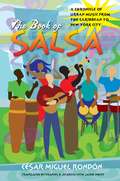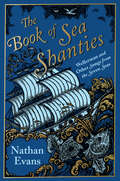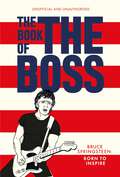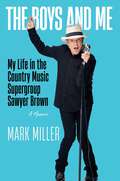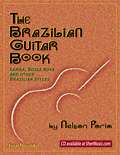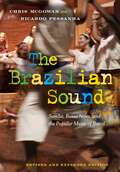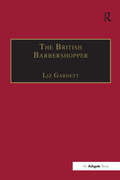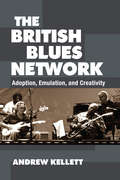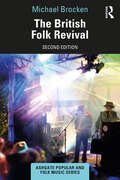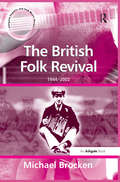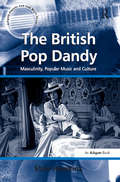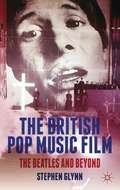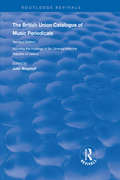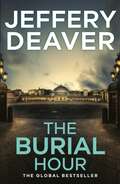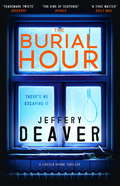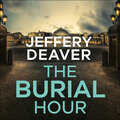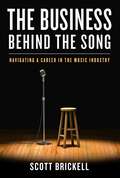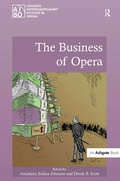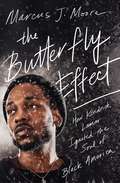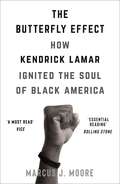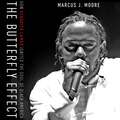- Table View
- List View
The Book of Salsa
by César Miguel RondónSalsa is one of the most popular types of music listened to and danced to in the United States. Until now, the single comprehensive history of the music--and the industry that grew up around it, including musicians, performances, styles, movements, and production--was available only in Spanish. This lively translation provides for English-reading and music-loving fans the chance to enjoy Cesar Miguel Rondon's celebrated El libro de la salsa.Rondon tells the engaging story of salsa's roots in Puerto Rico, Cuba, Colombia, the Dominican Republic, and Venezuela, and of its emergence and development in the 1960s as a distinct musical movement in New York. Rondon presents salsa as a truly pan-Caribbean phenomenon, emerging in the migrations and interactions, the celebrations and conflicts that marked the region. Although salsa is rooted in urban culture, Rondon explains, it is also a commercial product produced and shaped by professional musicians, record producers, and the music industry. For this first English-language edition, Rondon has added a new chapter to bring the story of salsa up to the present.
The Book of Sea Shanties
by Nathan EvansAn epic journey through sea shanties, high tides and seven seasFrom the international bestselling singer comes The Book of Sea Shanties.The world sang in harmony with Nathan Evans, the Glaswegian postie turned singer of sea shanties. Join him as he takes you through time and seafaring history to discover the true meaning of Wellerman, and who and what exactly was the Drunken Sailor?Featuring over 35 best loved shanties, Nathan will share the meaning behind each of his favourite shanties and show how they have shaped and inspired him. Beautifully illustrated throughout, it will also include original shanties and bonus content written exclusively for this book.Whether you're young or old, gather around and discover the riotous world of sea shanties.Praise for Nathan Evans:A 'Sea Shanty sensation' Rolling Stone'An artist who really lifts the mood when he performs' Daily Telegraph'Too good to miss' Brian May, Daily Express
The Book of Sea Shanties
by Nathan EvansAn epic journey through sea shanties, high tides and seven seasFrom the international bestselling singer comes The Book of Sea Shanties.The world sang in harmony with Nathan Evans, the Glaswegian postie turned singer of sea shanties. Join him as he takes you through time and seafaring history to discover the true meaning of Wellerman, and who and what exactly was the Drunken Sailor?Featuring over 35 best loved shanties, Nathan will share the meaning behind each of his favourite shanties and show how they have shaped and inspired him. Beautifully illustrated throughout, it will also include original shanties and bonus content written exclusively for this book.Whether you're young or old, gather around and discover the riotous world of sea shanties.Praise for Nathan Evans:A 'Sea Shanty sensation' Rolling Stone'An artist who really lifts the mood when he performs' Daily Telegraph'Too good to miss' Brian May, Daily Express
The Book of The Boss: Empowering words of wisdom from Bruce Springsteen
by Pop Press'I think I just wanted to be great'Born in the USA ... but loved around the world, Bruce Springsteen has been a musical icon for the last 50 years and continues to rock stadiums with his legendary shows.An outspoken ally for social justice, this collection of quotes showcases The Boss's wisdom on equality, performing and friendships and will inspire everyone to live a creative and confident life.
The Boswell Legacy
by Kyla Titus David McCain Chica Boswell MinnerlyThe Boswell Sisters rose to stardom during the Great Depression and established an enormously successful career in a very short time as pioneers of early mass entertainment, through the new media of electrical recordings, radio networks, and movies. Along with Louis Armstrong and Duke Ellington, they led an American jazz "invasion" of Europe in 1933. They were admired by their frequent singing partner Bing Crosby, idolized by a struggling trio from Minneapolis who later gained fame as the Andrews Sisters, and praised as "the best act I ever followed" by a trouper named Bob Hope. Ella Fitzgerald consistently credited Connie Boswell as her main influence and Irving Berlin singled her out as his favorite interpreter of his songs. The beautiful and talented Boswells sold out stage shows from New York to London and the number of records they sold is estimated to be over 75 million. Then suddenly, it was over. The time has finally come to tell their story. THE BOSWELL LEGACY is the first full-scale biography of these icons of American music, written by Kyla Titus, the granddaughter of Vet Boswell and caretaker of the voluminous Boswell family archives, as only she can tell it. Within these pages, readers may discover the answers to questions left unanswered for decades. Why did the Boswell Sisters disband? What was the cause of Connie’s paralysis? Why are the Boswell Sisters not household names today? And so many more. Most importantly, readers will learn about the development of a unique musical style that is timeless--a legacy--that is still heralded almost a century later.
The Boys and Me: My Life in the Country Music Supergroup Sawyer Brown
by Mark MillerThe Boys and Me is the behind-the-scenes, untold story of front man and lead singer Mark Miller and his band—country music icons Sawyer Brown!Before The Voice and American Idol, there was Star Search with Ed McMahon. In the first season, an eclectic and charismatic country-rock band called Sawyer Brown appeared on the show, taking America by storm. From ignored underdogs in Nashville to overnight rock stars from LA to New York, they swept the competition and won. Since 1984, &“the boys&” legendary live shows, along with their relentless drive to stay true to themselves, have captivated faithful fans around the world. As front man and lead singer of the band, Mark Miller&’s rise to fame wasn&’t exactly the path he envisioned for himself. After losing his father, Mark was raised by his mom whose solid faith and strong work ethic helped guide and shape him and his brother, Frank. With his sights set on playing pro basketball, Mark never dreamed of becoming an entertainer, especially considering he was terrified to stand on a stage. But God had a different plan. Now, forty years later, Sawyer Brown has eighteen studio albums to their name, multiple No. 1 singles, fifty-plus songs charting on the Billboard Hot Country Songs, and legendary award-winning videos. And they have no plans of stopping any time soon. The band&’s longevity is a testament to their strong songwriting, high-energy performances, and hard work. This is the behind-the-scenes, untold story of Mark Miller and &“the boys&”—country music icons Sawyer Brown!
The Brazilian Guitar Book
by Sher Music Nelson Faria* A complete guide to playing guitar accompaniment and chord melodies in various Brazilian styles -- Samba, Bossa Nova, Frevo, etc. * Comes with a CD of Nelson demonstrating each exercise, plus a tune in each style * Many variations of basic comping patterns written out, each with complete chord voicings. * Also includes short transcriptions of guitar parts as recorded by Toninho Horta, Joao Bosco, Joao Gilberto, etc.
The Brazilian Sound: Samba, Bossa Nova, and the Popular Music of Brazil
by Chris McGowan Ricardo PessanhaThis title includes discussions of developments in samba and other key genres, the rise of female singer-songwriters, works by established artists like Milton Nascimento and Gilberto Gil and the mixing of bossa with electronica.
The Bremen Town Musicians
by Ilse PlumeThe book is all about the four aged animal friends trying to make living for them as they were escaped from their cruel masters.
The Bremen-Town Musicians
by Ruth Belov GrossOn their way to Bremen-town, a donkey, a cat a rooster, and a dog, all planning on a new career in music, serenade some robbers.
The British Barbershopper: A Study in Socio-Musical Values (Ashgate Popular And Folk Music Ser.)
by Liz GarnettBarbershop singing is a distinctive and under-documented facet of Britain's musical landscape. Imported from the USA in the 1960s, it has developed into an active and highly organized musical community characterized by strong social support structures and a proselytizing passion for its particular style. This style is defined, within the community, in largely music-theoretical terms and is both highly prescriptive and continually contested, but there is also a host of performance traditions that articulate barbershop's identity as a distinct and specific genre. Liz Garnett documents and analyses the social and musical practices of this specialized community of music-makers, and extends this analysis to theorize the relationship between music and self-identity. The book engages with a range of sociological and musicological theoretical frameworks in order to explore the role of harmony, ritual, sexual politics, performance styles and 'tag-singing' in barbershop. This analysis shows how musical style and cultural discourses can be seen to interact in the formation of identity. Garnett provides the first in-depth scholarly insight into the British barbershop community, and contributes to ongoing debates in the semiotics and the sociology of music.
The British Blues Network: Adoption, Emulation, and Creativity
by Andrew KellettBeginning in the late 1950s, an influential cadre of young, white, mostly middle-class British men were consuming and appropriating African-American blues music, using blues tropes in their own music and creating a network of admirers and emulators that spanned the Atlantic. This cross-fertilization helped create a commercially successful rock idiom that gave rise to some of the most famous British groups of the era, including The Rolling Stones, The Yardbirds, Eric Clapton, and Led Zeppelin. What empowered these white, middle-class British men to identify with and claim aspects of the musical idiom of African-American blues musicians? The British Blues Network examines the role of British narratives of masculinity and power in the postwar era of decolonization and national decline that contributed to the creation of this network, and how its members used the tropes, vocabulary, and mythology of African-American blues traditions to forge their own musical identities.
The British Folk Revival: 1944-2002 (Ashgate Popular and Folk Music Series)
by Michael BrockenAlmost 20 years ago Michael Brocken created from his doctoral research, what became both a seminal and contested volume concerning the social mores surrounding the British Folk Revival up to that point in time: The British Folk Revival 1944–2002. In this long-overdue second edition he revisits not only his own research, but also that of others from the 1990s and early 21st century. He then considers how a discourse of folkloric authenticity emerged in the closing years of the 19th century and how a worrying nationalistic immanence came to surround folk music and dance during the inter-war years. Brocken also proposes that the media: records, radio and TV in post-WWII folk revivalism can offer us important insights into how self-directed learning of the folk guitar emerged. Brocken moves on to consider the business structures of the contemporary folk scene and how relationships are formed between contemporary folk business and the digital and social media spheres. In his penultimate chapter he discusses the masculinisation of folk traditions and asks important questions about how our folk traditions are carried and are authorised. In the final chapter he also considers the rise of an exciting new folk live music built environment.
The British Folk Revival: 1944–2002 (Ashgate Popular and Folk Music Series)
by Michael BrockenThe British Folk Revival is the very first historical and theoretical work to consider the post-war folk revival in Britain from a popular music studies perspective. Michael Brocken provides a historical narrative of the folk revival from the 1940s up until the 1990s, beginning with the emergence of the revival from within and around the left-wing movements of the 1940s and 1950s. Key figures and organizations such as the Workers' Music Association, the BBC, the English Folk Dance and Song Society, A.L. Lloyd and Ewan MacColl are examined closely. By looking at the work of British Communist Party splinter groups it is possible to see the refraction of folk music as a political tool. Brocken openly challenges folk historicity and internal narrative by discussing the convergence of folk and pop during the 1950s and 1960s. The significant development of the folk/rock hybrid is considered alongside 'class', 'Americana', radio and the strength of pop culture. Brocken shows how the dichotomy of artistic (natural) versus industry (mass-produced) music since the 1970s has led to a fragmentation and constriction of the folk revival. The study concludes with a look at the upsurge of the folk music industry, the growth of festivals and the implications of the Internet for the British folk revival. Brocken suggests the way forward should involve an acknowledgement that folk music is not superior to but is, in fact, a form of popular music. The book will create lively debate among the folk music fraternity and popular music scholars, as well as folklorists and ethnomusicologists. A unique discography and history of the Topic Record label is also included.
The British Pop Dandy: Masculinity, Popular Music and Culture (Ashgate Popular And Folk Music Ser.)
by Stan HawkinsWho are pop dandies? Why are stars like David Bowie, Jarvis Cocker, Pete Doherty and Robbie Williams so dandified? Taking up a wide range of British pop stars, Hawkins seeks to find out why so many have cast themselves in roles that often take style to absurd extremes. In this study, male pop artists are mapped against a cultural and historical background through a genealogy of personalities, such as Oscar Wilde, W.H. Auden, Andy Warhol, No Coward, Derek Jarmen, David Beckham and countless others. A critical analysis of issues and approaches to musical performance through masculinity becomes the focal point of this fascinating study. Ranging from the sixties to beyond the twentieth century, The British Pop Dandy considers the construction of the male pop icon through the spectacle of videos, live concerts and films. Why do we derive pleasure from the performing body, and how is entertainment linked to categories of gender and sexuality? The author insists that pop performances can be understood through human characteristics that relate to the particulars of dandyism, camp and glamour, and this he theorizes through the work of Charles Baudelaire. One of the political objectives of the dandy is to liberate himself through a denial of the structures that assume fixed identity. Not least, it is acts of queering in pop music that characterize entire generations of male artists in the UK. Setting out to discover what distinguishes the British pop dandy, Hawkins considers the role of music and performance in the articulation of hyperbolic display. It is argued that the recorded voice is a construction that idealizes self-representation, and absorbs the listener's attention. Particularly, camp address in singing practice is taken up in conjunction with a discussion of intimacy, which forms part of the strategy of the performer. In a range of songs and videos selected for music analysis, Hawkins points to the uniqueness of the voice as it expresses a transgressive quali
The British Pop Music Film
by Stephen GlynnThe first detailed examination of the place of pop music film in British cinema, Stephen Glynn explores the interpenetration of music and cinema in an economic, social and aesthetic context through case studies ranging from Cliff Richard to The Rolling Stones, and from The Beatles to Plan B.
The British Union Catalogue of Music Periodicals (Routledge Revivals)
by John WagstaffFirst published in 1998, the aim of this catalogue is to help students, researchers and librarians determine the UK locations of over 2,000 music periodical titles held in public, academic and national libraries. Over 220 libraries in the UK have been surveyed, from St. Austell to Aberdeen, Aberystwyth to Brighton. Each catalogue entry provides detailed information on library holdings, and full bibliographic details of periodical titles, including ISSNs. The main catalogue is preceded by an address list, and by a preface outlining the history of music periodicals in Britain, together with statistical tables.
The Burial Hour: Lincoln Rhyme Book 13 (Lincoln Rhyme Thrillers #1)
by Jeffery DeaverFrom the author of The Goodbye Man, discover Jeffery Deaver's chilling series that inspired the film starring Angelina Jolie and Denzel Washington, and is now a major NBC TV series Number one bestselling author and master of suspense Jeffery Deaver returns with the thirteenth Lincoln Rhyme thriller, which sees a crime go global . . .When a man is snatched from a New York street in broad daylight, the only clue is a miniature noose left on the pavement. By the time criminal forensic scientist Lincoln Rhyme is involved, a video of the missing man is already online, his dying breaths set to a grisly music by someone calling himself The Composer. Rhyme and fellow investigator Amelia Sachs must follow The Composer across the globe as he continues his horrifying creation, kidnapping further victims to add their last breaths to his piece. But with Rhyme and Sachs in a whole new world with its own rules, how can they possibly guess what danger they're in when the music finally stops?'If you want thrills, Deaver is your man' Guardian'One of the most consistent writers of clever, entertaining and often thought-provoking thrillers in the world' Simon Kernick'Deaver is a master of plot twists, and they are abundant in this story...essential for fans of the franchise' Daily Mail
The Burial Hour: Lincoln Rhyme Book 13 (Lincoln Rhyme Thrillers #13)
by Jeffery DeaverFrom the author of The Goodbye Man, discover Jeffery Deaver's chilling series that inspired the film starring Angelina Jolie and Denzel Washington, and is now a major NBC TV series Number one bestselling author and master of suspense Jeffery Deaver returns with the thirteenth Lincoln Rhyme thriller, which sees a crime go global . . .When a man is snatched from a New York street in broad daylight, the only clue is a miniature noose left on the pavement. By the time criminal forensic scientist Lincoln Rhyme is involved, a video of the missing man is already online, his dying breaths set to a grisly music by someone calling himself The Composer. Rhyme and fellow investigator Amelia Sachs must follow The Composer across the globe as he continues his horrifying creation, kidnapping further victims to add their last breaths to his piece. But with Rhyme and Sachs in a whole new world with its own rules, how can they possibly guess what danger they're in when the music finally stops?'If you want thrills, Deaver is your man' Guardian'One of the most consistent writers of clever, entertaining and often thought-provoking thrillers in the world' Simon Kernick'Deaver is a master of plot twists, and they are abundant in this story...essential for fans of the franchise' Daily Mail
The Burial Hour: Lincoln Rhyme Book 13 (Lincoln Rhyme Thrillers #13)
by Jeffery DeaverNumber one bestselling author and master of suspense Jeffery Deaver returns with the thirteenth Lincoln Rhyme thriller, which sees a crime go global...The only leads in a broad-daylight kidnapping are the account of an eight-year-old girl, some nearly invisible trace evidence and the calling card: a miniature noose left lying on the street. A crime scene this puzzling demands forensic expertise of the highest order. Lincoln Rhyme and Amelia Sachs are called in to investigate. Then the case takes a stranger turn: a recording surfaces of the victim being slowly hanged, his desperate gasps the backdrop to an eerie piece of music. The video is marked as the work of The Composer...Despite their best efforts, the suspect gets away. So when a similar kidnapping occurs on a dusty road outside Naples, Rhyme and Sachs don't hesitate to rejoin the hunt. But the search is now a complex case of international cooperation - and not all those involved may be who they seem. All they can do is follow the evidence, before their time runs out.(P)2017 Hodder & Stoughton Limited
The Business Behind the Song: Navigating a Career in the Music Industry
by Scott BrickellWhether you&’re an aspiring artist, a new college grad, or a seasoned professional, Scott Brickell&’s The Business Behind the Song is a must-have handbook for helping you navigate the often-confusing, seemingly unapproachable world of the music industry.Drawing on his years of experience as a manager for numerous record-breaking artists and bands, Brickell explains the nitty gritty details of what it takes to be an artist, a manager, a promotor, a booking agent, and much more. He shares industry secrets on the formula to a successful song, and he gives invaluable tips on how to put on a successful show and tour. No matter your goal—whether that&’s to be on stage behind a microphone or behind the scenes promoting shows—The Business Behind the Song will help you • Understand the industry before you get started • Learn the insider terminology • Identify the goals you need to set for yourself • Create a clear path for your future career • And start your own journey in the music business You can break into an exciting and fulfilling career in the music industry, and Scott Brickell&’s go-to guide will show you how.
The Business of Opera (Ashgate Interdisciplinary Studies in Opera)
by Anastasia Belina-Johnson Derek B. ScottThe study of the business of opera has taken on new importance in the present harsh economic climate for the arts. This book presents research that sheds new light on a range of aspects concerning marketing, audience development, promotion, arts administration and economic issues that beset professionals working in the opera world. The editors' aim has been to assemble a coherent collection of essays that engage with a single theme (business), but differ in topic and critical perspective. The collection is distinguished by its concern with the business of opera here and now in a globalized market. This includes newly commissioned operas, sponsorship, state funding, and production and marketing of historic operas in the twenty-first century.
The Butterfly Effect: How Kendrick Lamar Ignited the Soul of Black America
by Marcus J. MooreThis &“smart, confident, and necessary&” (Shea Serrano, New York Times bestselling author) first cultural biography of rap superstar and &“master of storytelling&” (The New Yorker) Kendrick Lamar explores his meteoric rise to fame and his profound impact on a racially fraught America—perfect for fans of Zack O&’Malley Greenburg&’s Empire State of Mind.Kendrick Lamar is at the top of his game. The thirteen-time Grammy Award-winning rapper is just in his early thirties, but he&’s already won the Pulitzer Prize for Music, produced and curated the soundtrack of the megahit film Black Panther, and has been named one of Time&’s 100 Influential People. But what&’s even more striking about the Compton-born lyricist and performer is how he&’s established himself as a formidable adversary of oppression and force for change. Through his confessional poetics, his politically charged anthems, and his radical performances, Lamar has become a beacon of light for countless people. Written by veteran journalist and music critic Marcus J. Moore, this is much more than the first biography of Kendrick Lamar. &“It&’s an analytical deep dive into the life of that good kid whose m.A.A.d city raised him, and how it sparked a fire within Kendrick Lamar to change history&” (Kathy Iandoli, author of Baby Girl) for the better.
The Butterfly Effect: How Kendrick Lamar Ignited the Soul of Black America
by Marcus Moore__________'Essential reading' Rolling Stone'A must read. The best bit of literature currently out there on Kendrick Lamar' VICE __________Kendrick Lamar is at the top of his game.He has been described as perceptive, philosophical, unapologetic, fearless, and an innovative storyteller whose body of work has been compared to James Joyce and James Baldwin.He is a visionary who will go down as history as one of the most important artists of all time.But what's so striking about Kendrick Lamar, aside from his impressive accolades, is how he's effectively established himself as a formidable opponent of oppression, a force for change. Through his confessional poetics, his politically charged anthems, and his radical performances, Lamar has become a beacon of light for many people in America.The Butterfly Effect not only Lamar's powerful impact on music but also on our current society, especially under the weight of police brutality, divisive politics, and social injustice. This is the extraordinary, triumphant story of a modern lyrical prophet and an American icon who has given hope to those buckling under the weight of systemic oppression, reminding everyone that through it all, "we gon' be alright".__________'By the end of listening to his first full album, I felt like I knew everything about him. He brings you into his world with his lyrics in a way that really paints a clear picture' Eminem'I love everything about his music. I can literally listen to his music and become a kid growing up with all the struggles in the inner city, but at the same time [learn] all the lessons it taught that we use as men today.' Lebron James'Kendrick Lamar understands and employs blues, jazz, and soul in his music, which makes it startling. His work is more than merely brilliant; it is magic' Toni Morrison'Lamar is a man living on a real and metaphorical peak, with one eye trained on the heavens, the other searching for stories in the valley below' Guardian
The Butterfly Effect: How Kendrick Lamar Ignited the Soul of Black America
by Marcus Moore'Kendrick Lamar understands and employs blues, jazz, and soul in his music, which makes it startling. His work is more than merely brilliant; it is magic' Toni Morrison'Lamar is a man living on a real and metaphorical peak, with one eye trained on the heavens, the other searching for stories in the valley below' Guardian __________Kendrick Lamar has been described as the poet Laurette of hip-hop, perceptive, philosophical, unapologetic, fearless, and an innovative storyteller whose body of work has been compared to James Joyce and James Baldwin. He is a visionary who will go down as history as one of the most important artists of all time. But what's so striking about Kendrick Lamar, aside from his impressive accolades, is how he's effectively established himself as a formidable opponent of oppression, a force for change. Through his confessional poetics, his politically charged anthems, and his radical performances, Lamar has become a beacon of light for many people in America. Now, for the first time, we will be taken on a journey of Lamar's life. Told through his three albums, The Butterfly Effect gives unparalleled insight into his background, influences and the importance of his music. The book traces not only Lamar's powerful impact on music but also on our current society, especially under the weight of police brutality, divisive politics, and social injustice. With exclusive interviews with his family, friends, and record producers, this book is the must-read for any fan.
